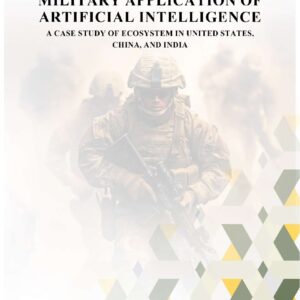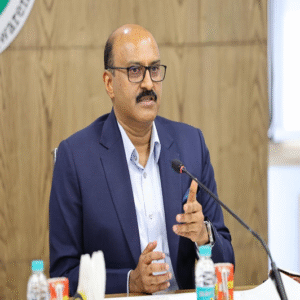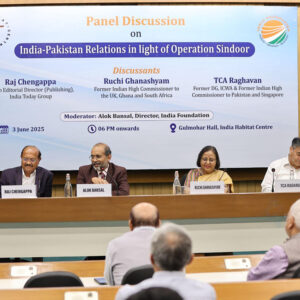As India announced cancellation of the proposed foreign ministers’ sit together on the sidelines of the UN General Assembly session, Pakistani media has gone berserk in accusing India, that she is not interested in contributing to peace process in the region. The Pakistani media hype is meant to convince the world community and perhaps the US as well, that India is the source of disquiet in the region.
Who does Islamabad want to convince by such wishful claptrap, Washington, London, Moscow or Beijing? Who has been calling Pakistan the epicentre of global terrorism? Where was the master-mind of contemporary terrorism discovered and killed by the American marines? Where are the premier terrorist organizations designated not only by the US but also by the UN, based? Which country has sought shelter behind the dubious identities called “non-state actors” and which country runs tens of thousands of religious seminaries throughout its length and breadth to prepare them for joining the ranks of jihadis who want the free world’s order to be replaced by antiquated radical conservatism and sharia order and the world turned into an Islamic Caliphate?
Hindsight will show that in near and distant past free and democratic India took many initiatives for bringing about rapprochement between the two neighbouring South Asian countries, India and Pakistan. How did Pakistan respond to late Atal Bihari’s initiative of bus trip to Islamabad or Modi’s unscheduled visit to the then Prime Minister Mian Nawaz Sharif? We know that Islamabad’s India policy is framed by GHQ and not by any other authority.
From day one of his government, PM Modi made Indo-Pak peace talks subject to Pakistan calling a halt to clandestine infiltration of armed and trained jihadis from Pakistani border in J&K to the India side of Kashmir. However, Pakistan claimed that she was fighting terrorism in Waziristan but simultaneously extending political, moral and material support to “Kashmir freedom movement.” Islamabad rulers often claim they were avenging the hostility of India of Bangladesh era. The revanchist mindset never left Pakistan and the rulers there never even tried to make some introspection particularly after the Humudur Rahman historic report, the like of which is seldom fond in the annals of human history.
Notwithstanding what has been said above, Prime Minister Modi believing that a change of government in Islamabad might also mean Pakistan’s readiness to be pragmatic in chalking out its India policy afresh, agreed that his foreign minister may meet with her Pakistani counterpart to talk and to discuss on the sidelines of General Assembly session in New York.
Pakistan failed to comprehend the spirit of this gesture and the pre-requisites necessary to maintain an environment conducive to the beginning of a new attempt. If Pakistan was sincere in its intention of promoting peace, it was of utmost importance that she should not do anything on the ground to scuttle the chance for resumption of bilateral dialogue. Pakistan allowed its terrorist outfits and the jihadis to continue their perfidy in Kashmir. Further, it angered New Delhi by issuing a stamp in the name of a rank terrorist who was in close liaison with the LeT chief.
Pakistan is under the misconception that it can bring India to talking table through a show of muscle power. We do not know who prepared Pakistan for this naivety. Why India withdrew from the proposed foreign ministers unscheduled meet in NY is lucidly explained by her External Affairs Minister, Sushma Swaraj in her address to the informal meeting of the SAARC ministers on the sidelines of the GA session in NY. She made it clear that peace meant negation of war. But entire peace spectrum stands vitiated by one member-country of SAARC. How can there be peace when war is waged by proxy and those proxy warmongers are labelled as non-state actors only to escape the blame of fomenting and fuelling crisis in the region. Sushma Swaraj lamented that the huge potential for development in SAARC region is wasted by one particular country which has allowed its soil to become the hotbed of jihadi terrorists.
The jihadi outfits sponsored, recruited, trained and indoctrinated by ISI have the patent assignment of disrupting peace and normal life in the region by unleashing proxy war in India and Afghanistan, which together make the largest part of the SAARC geographical region.
India had boycotted the SAARC summit that was scheduled to meet in Pakistani last year and Bhutan, Nepal and Afghanistan had joined India in the walkout. SAARC has made no progress worth its name. How can it make any progress when the government of one member country allows its land to be used by terrorist organizations for launching global terrorism?
Many among the opposition in Pakistan National Assembly have questioned Prime Minister Imran Khan sending an undiplomatic letter to Modi and suggesting renewed efforts for normalising relations. In the same way many critics at home have not approved Modi’s more than necessary overture in this regard. Perhaps some invisible hand somewhere has been moving behind the curtain to prompt both sides for resumption of dialogue. If that is the case, the initiative should have been left to the lower ministerial rungs. Perhaps both sides have overdone their job.
While Pakistani foreign minister is knocking at various doors in the US in a bid to seek moratorium on Trump’s aid cancellation spectacle, Prime Minister Imran Khan made a sudden jaunt to Riyadh despite his election promise of not going on a foreign tour for first three months in office. This may be the fourth or fifth time for Saudi monarchy to bail out Pakistan from financial crunch. At the same time Shah Mahmood Qureshi once again carried his beggar’s scrip to the doorsteps of IMF
Notwithstanding Imran Khan’s penchant for US-bashing psychosis, Washington is not going to stop its effort of chalking out a working formula with Imran Khan’s regime for bringing about substantial change in Afghan political scenario. India, including Kashmir, undoubtedly figures in their narrative. All that one would say is that a goodwill dialogue between the arch rivals should precede political dialogue.
(Prof. K.N. Pandita is the former Director of the Centre of Central Asian Studies, Kashmir University, Srinagar.)



